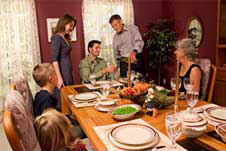
Orchestrating family dinner can be tricky when both adults and children have busy schedules. Sometimes the best we can do is to break out the Spaghettios and call it good. And you know what? That’s just fine.
Here’s the good news: you don't need to stress about having (or not having) amazing cuisine. If you’re a great cook, wonderful! “Soup’s on!” will bring them running. But if you don’t love spending time in the kitchen, keep dinner simple and doable. Adapt scheduling and menus that work for you. The magic of family dinner is not about what’s on the table; it’s about what happens at the table as you gather around it. Ideas for successful family dinners follow.
Promote Healthy Families
“The healthy family values table time and conversation” (Curran 62). Curran goes on to quote Dr. Lee Salk, “Meal time is incredibly important. . . . You can talk about your dreams; you can talk about your day; you can talk about your frustrations. The busier you are, the more valuable meal time is for your child” (63).

Create Connections
Do you have any happy mealtime memories from your childhood? How can you create similar positive experiences for your own family?
The ritual of enjoying a meal together connects family members, offering us the opportunity to focus completely on each other. Having dinner together is linked to children’s emotional, physical, and psychological well-being.
Meals can become some of the activities we most anticipate and remember--day-to-day meals as well as meals prepared for special occasions. For example, a family with Swedish ancestry has special Swedish pancakes for breakfast on general conference days. Another family is blessed with a grandmother who always asks the birthday grandchild to choose whatever special food he wants around the time of his birthday (see Jenene Wolsey Baadsgard, “Mealtime. Family Time.” Ensign, Sept 1998, 22).
Turn Offs
“I’m so glad I caught you.” People expect us to be home during the dinner hour, so they’ll often call us then. Taking the phone off the hook and turning off cell phones will help you avoid concern over that “important” phone call. Consider turning off interruptions in other ways as well: As one researcher advises, “Don’t allow television to become part of the menu” (Curran 62). Even turning off the lights and eating by candle light can make dinner feel more like a special time (and we think it makes Top Ramen taste better).
Great Cooks, Great Food!
Try to have as many family members as possible participate in making the meal. Even small children can help—doing things as simple as unwrapping the butter. Though this might be more effort for you, it will likely decrease the “Sick! What is this?” response we all love to hear.
Table Play
Play games that encourage sharing and communication. “Apples and Onions” is a game in which each family member tells one good thing and one hard thing about his or her day during dinner time—things family members would not otherwise know.
Warm Fuzzies
Keep things positive. Family dinner shouldn’t become a place for heavy discipline or assignment of chores. Keep the table atmosphere as inviting and warm as possible.
Supports
Several books are available on starting fun family dinner conversations, including Table Talk: Creating Meaningful Conversations with Family and Friends by Karol Ladd (2002). Table topics conversation card sets can be purchased, or you could make your own set tailored for specific members of your family. Some families like to use a set prompt that has proved helpful in eliciting participation from each child.
No Child Left Behind
If a child is eating a meal the rest of the family has already finished, consider doing a family project of some kind at the table, just to be with him or her.
Count On It
Having a consistent time for dinner each evening will make it easier for family members to plan on being there.
Tasty Websites
There are very helpful websites on meal preparation and mealtime conversation.

Today’s society is moving away from families having dinner together. This isn’t surprising; it takes a lot of effort to coordinate schedules and prepare food for all family members. However, as we work to keep the ritual of family dinner intact, we’ll have an increased sense of family unity and a chance to communicate with our children that we might miss otherwise.
Research has shown that there are few things we can do as parents that have as much potential to make a positive impact as regularly eating meals together as a family. Even if you can only eat together once or twice a week, doing so can make a difference in your home.
When we thank the Lord for our food, pray for His blessings, and share the meal as a family, dinner time can become a powerful bonding ritual. Family dinner is a tradition worth preserving.
Sources
Baadsgard, Jenene Wolsey. “Mealtime. Family Time.” Ensign. Sept. 1998: 22.
Curran, Dolores. Traits of a Healthy Family. New York: Ballantine Books, 1983.